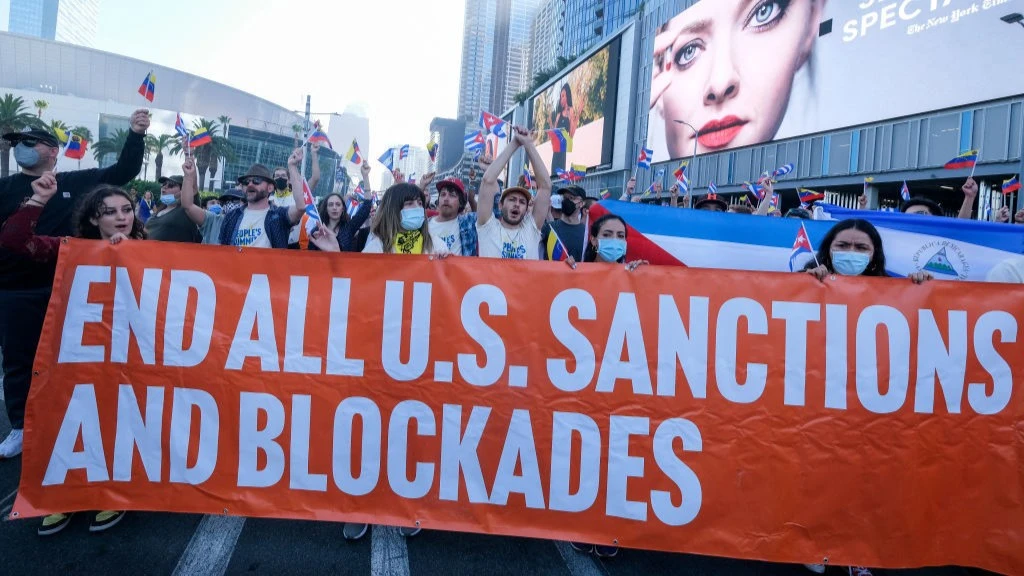US-led sanctions have functioned as ‘silent killers’ in countries such as Iraq, Syria, and Venezuela
Broad economic sanctions, often portrayed as a less violent alternative to war, are responsible for an estimated 564,000 deaths each year – most of them children under the age of five – according to a new study published on 25 July in the Lancet Global Health.
The research analyzed data from 152 countries over a 10-year period and found the mortality toll of sanctions to be comparable to that of armed conflict.
Authored by economists Francisco Rodriguez, Silvio Rendon, and Mark Weisbrot, the study underscores the devastating impact of sanctions on public health and essential infrastructure.
By targeting key economic sectors such as finance and energy, sanctions restrict access to critical imports like medicine, food, and parts for water and electrical systems, causing widespread suffering without the visible devastation of bombs and missiles.
The US, which imposes more sanctions than any other country, has increasingly turned to these measures as a tool of foreign policy. While often justified as a nonviolent means of pressuring adversaries, experts argue that the resulting human cost is anything but peaceful.
“Sanctions are becoming the preferred weapon of the United States and some allies – not because they are less destructive, but because the toll is less visible,” Weisbrot wrote in a commentary for the Los Angeles Times. “They kill silently, without the political cost of war.”
The case of Venezuela illustrates the lethal impact of sanctions. After the US imposed sweeping economic restrictions in 2017 and further escalated them under the administration of US President Donald Trump, the country plunged into a historic depression. Between 2012 and 2020, Venezuela’s economy contracted by 71 percent – three times the depth of the Great Depression in the US – with tens of thousands of deaths directly linked to the sanctions, according to multiple studies.
Children under five are especially vulnerable. Sanctions increase rates of malnutrition, making children more likely to die from otherwise treatable illnesses such as measles, pneumonia, and diarrhea.
The study’s findings are consistent with prior research from the Bank for International Settlements (BIS) and other institutions that show sharp rises in mortality during economic recessions.
Critics argue that US sanctions violate both international and domestic law. They are considered collective punishment under the Geneva and Hague conventions and are illegal under the Charter of the Organization of American States. US law also requires that sanctions be imposed only in response to a “national emergency” caused by a foreign threat – criteria rarely met in practice.
Despite the grim statistics, researchers believe that public awareness could force change. “The invisibility of sanctions is their greatest political asset,” Weisbrot noted. “But once exposed, they become indefensible.”
Following Iraq’s invasion of Kuwait, the UN, heavily influenced by the US, imposed sweeping sanctions on Iraq beginning in August 1990 and lasting until the 2003 US invasion.
Iraq’s economy collapsed. Its infrastructure – particularly water, sanitation, and health systems – could not recover from war damage without access to foreign parts and supplies blocked by sanctions.
UNICEF reported that by the late 1990s, sanctions contributed to the deaths of over 500,000 Iraqi children under five due to malnutrition, disease, and lack of medicine.
After the beginning of the covert US–Israeli war to topple the Syrian government in 2011, the US imposed successive waves of sanctions targeting the former Syrian government of president Bashar al-Assad, including the Caesar Act in 2020, which extended penalties to foreign entities dealing with Syria.
Consequently, the Syrian pound lost most of its value. Prices for basic goods skyrocketed, and subsidies on food, fuel, and medicine eroded.
As of 2025, 90 percent of Syrians live in poverty.
At the same time, sanctions discouraged international investment and desperately needed reconstruction efforts after 14 years of war.

